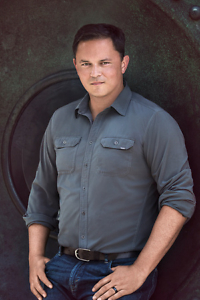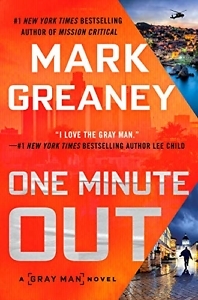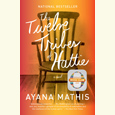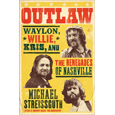Between Black and White
Mark Greaney talks with Chapter 16 about his ninth Gray Man novel
For the ninth installment of his Gray Man international thriller series, One Minute Out, Memphis writer Mark Greaney decided to write his protagonist Court Gentry’s narrative in first person, which has caused some controversy among his fans. While this stylistic choice has raised the ire of some, the subject matter of human trafficking presented a giant challenge to Greaney as a writer. How does a thriller writer known for entertaining mayhem address the real horror of modern-day sex slavery without being exploitative?
 What follows is an edited excerpt from an interview conducted for WYPL-FM’s Book Talk program. (Access the full podcast and a video excerpt of the interview below.)
What follows is an edited excerpt from an interview conducted for WYPL-FM’s Book Talk program. (Access the full podcast and a video excerpt of the interview below.)
Chapter 16: As the book opens up, we meet Serbian war criminal Ratko Babic, and Court Gentry is going to give him what he deserves.
Mark Greaney: Yeah, I’ve been excited about writing this book for a while because I had this super general idea that Court is on a mission of revenge for something that happened a long time ago, that nobody’s thinking about. This guy is a Serbian war criminal, and Court feels like he deserves righteous justice, extra-judicial assassination. So he goes to do that, and then the second-order effects and the third-order effects of what he saw as a righteous mission is what propels the rest of the book. He finds out within 15 pages that human trafficking is going on, and that sets his course. I studied the Bosnian civil war a lot. I actually wrote a book about it that was never published — fiction — but Ratko Mladić is who this is based on.
Chapter 16: It’s hard to believe that was almost 30 years ago when all that started.
Greaney: Yes, specifically the Srebrenica massacre, which was in July of 1995, so 25 years ago now. It was this horrific crime [and] the U.N. was partially responsible for what happened, but Ratko Mladić ordered the execution of somewhere around 8,000 men and boys.
 Chapter 16: Back to the contemporary story line, the psychological toll on the people involved in human trafficking is just incredible.
Chapter 16: Back to the contemporary story line, the psychological toll on the people involved in human trafficking is just incredible.
Greaney: I realized very quickly that, when you’re male, it’s a dicey subject to talk about. My research showed me the brutality and the cruelty and the inhumanity of a lot of this. It reminded me of my third Gray Man novel, Ballistic, about the Mexican drug wars. The more research you did, the more your mouth dropped to the floor, that people can be this horrible to one another. It’s still hard to accept. And I was feeling the same way while researching this book, and the psychological aspect of it is among the worst parts.
Chapter 16: I thought back to your second book, On Target, because Gentry is put into a position where every decision is bad, and what do you do at that point?
Greaney: I am fascinated with stuff like that. I’ve realized as the series has gone on, I’m not really an answer man. I’m a question man. And, I wish I had all the answers, but as I do my research, I come up with a lot of questions and then I want the character to wrestle with these questions, as well. And I realized recently that I’m equally concerned with the reader learning something new in the story and the hero learning something new about himself or about the world around him. So this was a story that the more research I did, the more I wanted to talk about it. And then you realize that you can’t really pull punches. You don’t want to be salacious, but it’s dark subject matter.
Chapter 16: Of course, I was understandably very uncomfortable with what’s going on, but I thought back in all of these books that there’s people getting killed and murdered all over the place. However, human trafficking does hit at a different spot emotionally.
Greaney: Yeah, I had exactly that experience writing it. I remember talking to my editor, and it was too late to change the story because of where I was in the book and I’m like, “You know, this is really tough to thread the needle of talking about this and not being gratuitous and not using anything for shock value.” You know, these books have to have lightness and dark in them, and it was tough to take this really heavy subject matter and deal with it. But I told myself, “Talk about what’s happening, the brutality of it, the cruelty of it, and get some people out of it. So, at least fictionally, you can get some satisfaction.
Stephen Usery is the producer of Book Talk, an author interview program that airs Saturdays at 11:30 a.m. Central Time on WYPL FM 89.3, a service of Memphis Public Libraries. He lives in Memphis.





